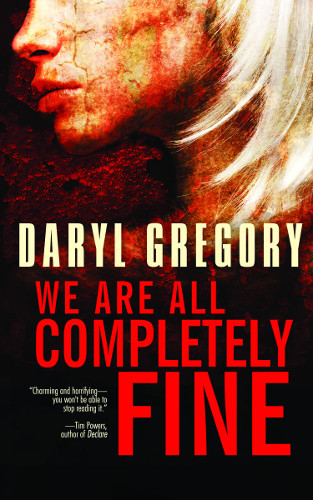WE ARE ALL COMPLETELY FINE is by turns creepy, funny, thought provoking, touching, and creepy again

For SFBook Reviews, Nate Hawthorne lavishes praise upon Daryl Gregory’s We Are All Completely Fine.
We Are All Completely Fine is by turns creepy, funny, thought provoking, touching, and creepy again. (I read it late at night while sitting by a window in my living room; it had me jumping as the wind blew and my house creaked.) As with Gregory’s other works, Afterparty, Raising Stony Mayhall, Pandemonium, and The Devil’s Alphabet, the novella mixes action and suspense in impossible circumstances with believable stories about fully human characters – even if they’re not exactly human. Each of the characters in We Are All Completely Fine and the events they lived through could be the subject of a standalone novel. Over each of their shoulders we get interesting and sometimes disturbing glances at a richly detailed dark fantasy world populated with malevolent forces. That Gregory subordinates those glimpses to the plot and characters, rather than pausing to show off how cool the ideas are, speaks to his skill as a writer: he could have easily spent more time on those details at the expense of the story’s suspenseful pacing.
The work leans, though lightly, on H.P. Lovecraft-esque themes: cultists worship incomprehensible other-dimensional creatures somewhere between aliens and gods, people touched by these creatures struggle to maintain their sanity or become violently insanse, and the work alludes to tragedy in a town called Dunnsmouth, a mix of Lovecraft’s Dunwich and Innsmouth. Like in Lovecraft’s work, Gregory’s characters inhabit a universe fundamentally hostile or indifferent to humans, but unlike in much of Lovecraft’s work, Gregory’s characters find just enough healing, peace, and livability to make the story not be completely bleak. In a way this makes the horror all the more intense, because it underlines the very slim but real hope for human happiness amid forces that create great misfortune. These characters aren’t predestined to be doomed, they just are very probably doomed. That’s a different kind of awful, one that’s more true to actual life and that is in a way more awful.
Read the rest of Hawthorne’s review at SFBook Reviews.
For information on We Are All Completely Fine, visit the Tachyon page.
Cover design by Elizabeth Story.
